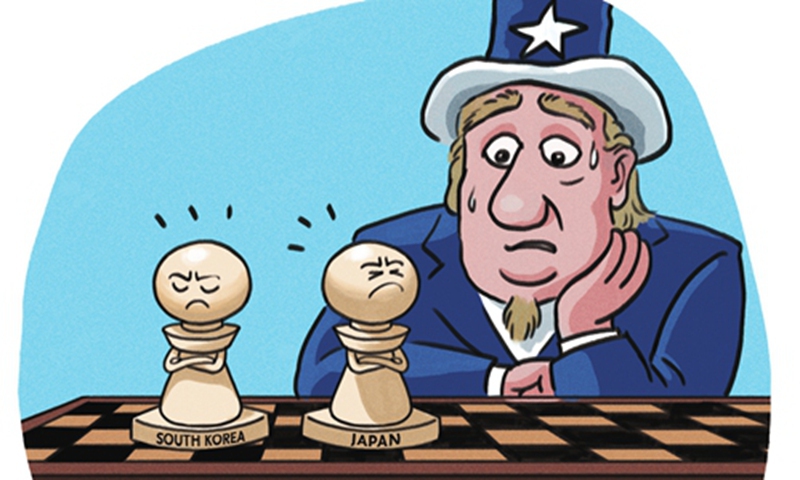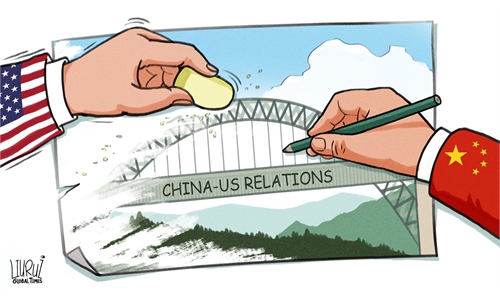
Illustration: Liu Rui/GT
The US' goal of making the US, Japan and South Korea a closer security alliance is likely to take a step further.
According to the Financial Times, Washington is pushing for a historic joint statement when the three leaders meet at Camp David this month, and the US wants "Japan and South Korea to agree that each nation has a duty to consult the others in the event of an attack."
The US has been attempting to build a closer US-Japan-South Korea security cooperation mechanism, which is part of its efforts to achieve the 2.0 version of the Indo-Pacific strategy in Northeast Asia. It is not a purely defense mechanism, but in fact an offensive security mechanism, said experts.
There is a possibility that this joint statement will be used as an excuse and it will be easier to deploy military force in the future, so therein lies the danger, said Yang Danzhi, a senior researcher on national security studies at Renmin University of China.
However, Shen Shishun, director of the Department for Asia-Pacific Security and Cooperation at the China Institute of International Studies, holds that Japan and South Korea want to confront and weaken China relying on the US' strength. They know clearly that there is not the slightest hope of challenging China alone, and that will only bring them into a more dangerous situation, while the purpose of the US is to incite a proxy war, and then reap the fruits. The US not only takes Japan and South Korea as pawns, but more as cannon fodder.
Furthermore, the Financial Times mentioned that the Japanese government declined to comment on this issue, but some Japanese officials have pointed out that "the US-Japan security treaty did not allow trilateral collective defence."
The possibility of Japan becoming more deeply involved in the trilateral security cooperation can't be ruled out now as it is domestically skewed to right-wing forces and aims to become a military power. Nevertheless, Japan will definitely take into consideration the more risks it is exposed to.
If South Korea participates, Japan may have to increase its involvement in the Korean Peninsula affairs, which could cause more security risks. Japan should carefully weigh the relevant impacts, because its series of moves that undermine regional security have raised great concerns from regional stakeholders.
Although the White House said the three leaders "will celebrate a new chapter in their trilateral relationship" at the summit and "reaffirm their strong bonds of friendship and the ironclad alliances" between the US, Japan and South Korea, it is possible the two allies may want to change their current policies and measures if they have to take on too many obligations and face greater risks yet have little benefits.
If this form of cooperation or some basic principles are established by the statement with the US, it will be hard to change later, which is why the rulers of Japan and South Korea need to be prudent.
In addition, it would be premature to conclude that South Korea and Japan have resolved all their differences. If South Korean President Yoon Suk-yeol loses power, for example, there could be changes in the future of South Korea-Japan relations.
Not to mention those domestic different voices for their own national interests. The fact is that China still keeps official and civilian ties with both Japan and South Korea. It indicates that not all voices in the two countries follow the US. The countries and people that cherish peace will resist the trilateral alliance between the US, Japan and South Korea.
Meanwhile, considering the geographic proximity, once the US-Japan-South Korea alliance is strengthened, the threat to China's security will rise.
This could lead to an arms race in Northeast Asia. If the US, Japan and South Korea continue to upgrade their cooperation and deploy more strategic arms, North Korea, Russia and China will face considerable security threats, and then take corresponding measures.
China will continue to make efforts for regional stability, and it is hoped that Japan and South Korea will also safeguard the regional security and attach more importance to friendly cooperation with China as well as benign regional development.

